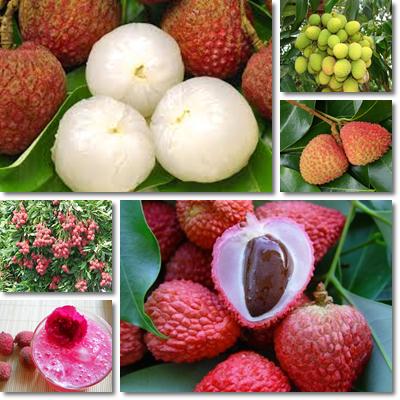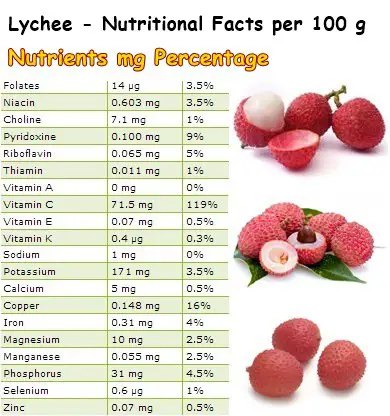Lychee, or litchi, botanically known as Litchi chinensis, is a fragrant, refreshing pink tropical fruit and an important source of vitamin C. Although litchis boast an average nutritional value, similar to that of grapes, they are a good source of polyphenols with powerful antioxidant activity. They are a safe fruit to eat if you need to keep your cholesterol levels low and sodium intake under control and further help strengthen the immune system and provide anti-aging benefits.
Litchi is low in calories and contains an antioxidant polyphenol called oligonol which is said to limit kidney and liver damage in diabetic people. Moreover, the fruit is believed to prevent infection with the influenza virus, reduce symptom severity and speed recovery because of its good content of vitamin C, a nutrient with strong antiviral, antibacterial and immune stimulating properties.
Eating litchi has tonic properties and provides benefits for energy metabolism as a result of a good B vitamin content and mineral profile.

Where does litchi come from?
Litchi, or lychee, is a tropical fruit, meaning it can only grow in hot, humid climates such as those of India, China, Bangladesh, Jamaica, Florida, parts of Australia and Africa. It is rather perishable so it should be consumed as fresh as possible as soon as possible. Once its shell starts softening a little, it is already ripe enough to be eaten. Waiting even one more day past this point can result in the fruit spoiling and becoming unfit for consumption.
Unripe litchi is unsafe for consumption and should be avoided, especially by children and pregnant women who are most sensitive to its side effects.
What does litchi (lychee) look like?
Litchi are either round or slightly heart-shaped, with a hard, pink, often bumpy rind when ripe. Unripe lychee fruit are green. Depending on the variety, litchi may have a smooth rind or small, red-pink prickles all over it. Lychee rind is both inedible and really thin so it can be peeled off easily before eating the fruit. The flesh of the fruit is white, glossy, juicy and fragrant and covers one shiny, red-brown seed the size of an almond.
What does lychee (litchi) taste like?
In my opinion, lychee has a grape-textured, juicy flesh and a strong fruity-sweet fragrance. Unlike grapes, it’s significantly more aromatic and sweet, making a great dessert on its own. I admit I prefer litchi to all other sweets and, to me, it’s even better than chocolate. If you are looking to lose a few pounds or kilograms, cut down on candied sweets or maintain your figure, you can substitute your regular dessert with a handful of lychee. Not only are they low in calories, but they will also satisfy your craving for something sweet and their juiciness will help keep you hydrated.

Where to find litchi
Anywhere tropical, litchi is available fresh when in season. You can find it in supermarkets, farmers markets or street markets. Outside its native range, litchi is available fresh in supermarkets only during a specific time frame, for example December through February in Europe, and in limited amounts. Dried or canned litchi is also available in supermarkets off season, but not all supermarkets may carry it.
The dried version is sometimes called litchi nut because of its nut-like proportions and dried, darker flesh. Litchis can be refrigerated in which case their rind turns brown just like the peel in frozen bananas. However, fresh litchis are always better and more nutritious.
What are the health benefits of litchi?
Overall, litchi is a fruit of low to medium nutritional value, meaning it is slightly more nutritious than apples and grapes. Nevertheless, 100 g of fruit provides 119% of the RDA of vitamin C, a potent antioxidant and anti-inflammatory vitamin with several wonderful health benefits. Being rich in vitamin C (71.5 mg), lychee helps develop resistance against infectious agents by strengthening the immune system.
Moreover, it helps prevent wrinkles and saggy skin because the vitamin C in the flesh stimulates the production of collagen, a protein that gives structure to skin, bones and other tissues. Last but not least, litchis provide antioxidant protection against free radicals, harmful reactive oxygen molecules which cause damage to cells and DNA. A generous intake of antioxidants is said to help in the prevention of chronic disease (cancer, diabetes, neurodegenerative diseases) by limiting cell damage.

Litchi contains small amounts of other vitamins and minerals, notably folate, niacin, pyridoxine, riboflavin (B vitamins), potassium, copper, iron and phosphorus. Eating litchi thus contributes to a good overall health. Being juicy, it adds to our daily fluid intake, meaning it helps prevent dehydration and its symptoms. Drinking plenty of water and eating plenty of juicy fruits helps relieve constipation and prevent and manage hemorrhoids as well as dehydration, especially during summertime when it can prove hazardous in combination with high temperatures.
Litchi is cholesterol-free and sodium-free, making it an excellent fruit for anyone suffering from cardiovascular problems, who is also on a strict, low-fat, low-sodium diet. Oligonol, a potent polyphenol found in litchi, adds to the health benefits of the fruit. Oligonol appears to reduce inflammation, thought to be the preliminary form of chronic disease. Diabetes, cardiovascular disease and almost all forms of cancer have been linked to high inflammation levels.
Although the mechanisms have not yet been fully or even partially understood, it appears that keeping inflammation markers under control can prevent the installation of chronic disease. Litchi and other vitamin C-rich foods are ideal for reducing inflammation levels in the body.
Also, preliminary research has found oligonol, the special compound in litchi, to significantly limit the transmission of the flu virus in the body or at least of common flu strains and stimulate blood circulation. Moreover, due to its powerful antioxidant activity, this polyphenol is said to promote loss of fat around the abdominal area called visceral fat. Most studies show that abdominal fat is the most dangerous type because it wraps around our internal organs.
Lastly, the fruit is a rich source of flavan-3-ols (flavans) and anthocyanins, other potent antioxidants which promote good overall health and offer antioxidant protection against oxidative stress. Actually, these antioxidants are also natural pigments and are responsible for the beautiful pink color of the fruit shell and parts of flesh.
Conclusion
Overall, litchi is a deliciously-flavored and fragrant fruit with good nutrition and the potential for providing several wonderful health benefits. Despite its relatively modest, but varied nutritional profile, it is a valuable tool in the fight against chronic and infectious diseases. If available in your are and accessible price-wise, it would make a great dessert for the entire family, sweet, refreshing, hydrating and nutritious.
